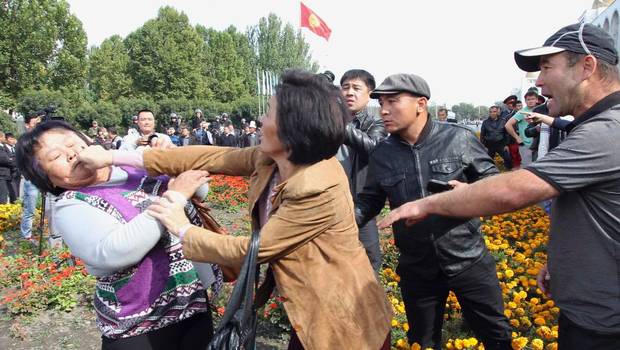
During a protest in Bishkek, Kyrgyzstan, calling for mine nationalization in October 2012 (Reuters: Vladimir Pirogov)
As old as Cortez and colonialism, the quest to satisfy modern appetites underlines economic scarcity and, increasingly, political instability. Mining in less-mature economies runs the same risks as its fossil fuel cousins.
Over several days in late May, protestors in Kyrgyzstan cut off power to its Kumtor gold mine, vital to the country’s economy; they clashed with police and spurred protests in other provinces, including the capital. At issue: unjust contract terms with the foreign operator, and calls for mine nationalization, both grievances that have been simmering for over 20 years.
Last August at a platinum mine in South Africa, over a week-long strike, 44 people were killed, mostly miners yet also security personnel. Subsequent allegations of police torture hardly calmed relations, which teeter on working and lodging conditions. In this last month similar strikes broke out, with rival unions competing for workers, all while lower precious-metal prices complicate meeting wage demands. With extractives at 18 percent of total GDP, and as a top gold, diamond, and coal exporter, South Africa cannot afford a breakdown in its mining sector.
In nations with less-industrialized and less-diversified economies, dependence on mining for revenue and employment can expose political flashpoints. (South Africa is classified by the World Bank as “higher-middle income,” yet the prominence and dynamics of its mining sector are comparable to lower-income nations.)
In steps to liberalize their economies, less-industrialized nations often begin with extractive resources. As with oil and natural gas, so with metals and stones: international investors are waiting at the door, pen in hand and equipment ready. It’s easy and the money to state coffers immediate.
So easy, that those who control the assets can become wealthy overnight, now an old story among international observers. Widely known as the “resource curse,” authoritarian states can tighten their grip on an already suppressed citizenry; public services may improve, but rarely does political pluralism.
Those in charge have little incentive for more representative government, or economic reforms, that would only result in a smaller share of the pie. Some of the more blatant examples in recent years, for oil and gas, include Azerbaijan, Turkmenistan, and Nigeria. For mining, this is true of the “conflict diamonds” of Sierra Leone and Democratic Republic of the Congo, or simply ignoring rights of the general populace, such as gold mines in Guatemala.
As competition increases for mined commodities, such as rare earth metals, host nation factors such as 1) political instability and 2) precedents for state vs private economic development become more focused. While industrialized nations debate the optimal mix of public vs private, lower-income nations often also have to consider ethnic and/or tribal alliances.
Additional risks of quick access to extraction include soil and groundwater toxicity, and marginalized cultural heritage. Host nation production contracts need to address environmental considerations and archaeological assessment. A June 2012 conference considered these factors in studying a Chinese firm at the Afghan copper site Aynak. In other nations, such as Guatemala, cyanide has traditionally been used in gold extraction.
Nations with new and/or scattered exposure to international investment projects usually do not have a legal sector with relevant experience, such as licensing and production agreements, much less provisions for protecting — what would otherwise be addressed in a more mature sector — established citizens’ rights.
In addition to mineral resources, questions of land privileges in lower-income nations are another symptom of the corporate/state quest for access and economic growth. A June article in The Economist profiles ongoing disputes brought by indigenous groups in Brazil, who claim tribal areas currently occupied by farmers.
Who has managed mining well?
Where are the highest risks for instability?
Diamonds in the rough
A successful mining policy should be considered in light of ideal practices: management by an impartial broker, and dissemination of revenues to a nation’s citizenry through services or improved infrastructure. The debate of natural resource extraction as a partner to economic development continues.
One cause for optimism is the Extractive Industries Transparency Initiative (EITI), an international forum offering compliance to governments on their level of contract transparency. Openly publishing payment amounts and who receives what, it is reasoned, offers all stake-holders better terms. Since its inception in 2002, EITI now has 23 compliant countries, 13 of them in Africa. (Though Norway is compliant, no other OECD nations appear to be candidates, implying that EITI is aimed at lower-income countries.)
For U.S. companies, parts of the recent Dodd-Frank legislation prohibit business with groups who operate in Democratic Republic of the Congo or the broader African Great Lakes region, and require oil, natural gas, and mining companies (per SEC rules) to “disclose certain payments they make to governments for resource development on a project-by-project basis.” As expected these have raised questions of added costs for compliance.
Another initiative is the South-South Partnership program, facilitated through the World Bank, matching up countries with successful reform records with others not as far along. A notable example has been the pairing of Brazil with Tajikistan, which has one of the world’s largest silver deposits, yet insufficient infrastructure and anemic legislation.
Then there are the lesser-known stories, such as West Papua, Indonesia. A pristine region of proven reserves of gold, copper, and oil, it appears to be another example of a state authority partnering with multinationals to extract a range of commodities, with little regard for local residents. It is one of the country’s poorest areas, yet its Grasberg mine is said to have the largest recoverable reserves of copper and gold in the world. Perhaps this is another job for Brazil.